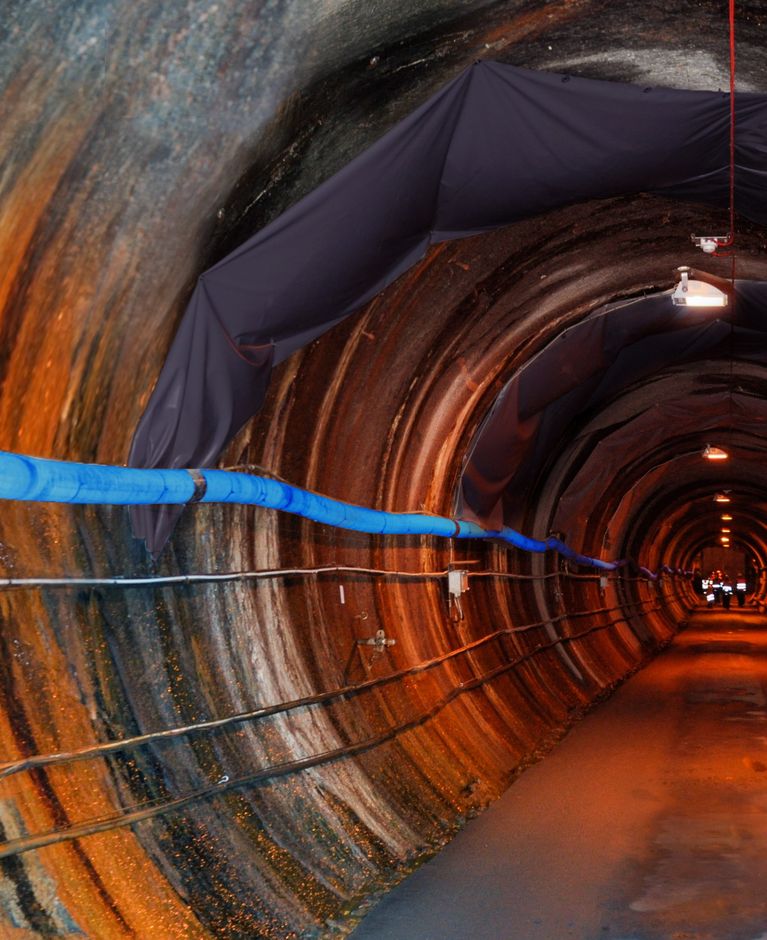
GeoLaB
A geoscientific underground laboratory for the geothermal energy research
Research for the sustainable and safe use of deep geothermal energy
"Geothermal energy has huge potential. In Germany, we could use it to replace a third of our gas requirements for heating - and in view of the climate catastrophe and the geopolitical situation in the world, we cannot do without it."
Prof. Dr. Holger Hanselka, former president of the Karlsruhe Institute of Technology
The GeoLaB (underground geothermal laboratory) is a planned rock laboratory. The aim of the research is the safe and sustainable use of the most important geothermal resources in Germany and worldwide.
An underground geoscientific laboratory is to be excavated in fractured crystalline rock. This rock, which includes granite, for example, has the greatest geothermal potential for heat supply and electricity generation in the world. However, this energy treasure has hardly been used to date.
GeoLaB research focuses on geoscientific and geotechnological issues relating to deep geothermal reservoirs. The aim is to gain a better understanding of the complex processes involved in the development and use of reservoirs. Based on these scientific findings, sustainable and safer utilization strategies for energy production from crystalline rock are to be developed.
"With the underground laboratory, we are breaking new scientific ground and taking geothermal research worldwide a decisive step further."
Prof. Dr. Oliver Kraft, Karlsruhe Institute of Technology
GeoLaB is designed as a joint research infrastructure of the Helmholtz research fields "Energy" and "Earth and Environment". Because only if both perspectives come together in GeoLaB can environmentally friendly technology development succeed. In this way, synergetic research will combine a future-proof energy supply with the sustainable use of resources.
GeoLaB was launched in 2023 as a strategic expansion investment by the Helmholtz Association. The project is currently in the planning and exploration phase. This includes site selection under scientific, technical and socio-economic aspects.
GeoLaB is coordinated by KIT. Helmholtz partners are GFZ and UFZ. The research alliance is completed by the TU Darmstadt and the BGE:
The Technische Universität (TU) Darmstadt contributes its regional geoscientific, in particular hydrogeological, expertise to GeoLaB. During the concept development phase, for example, TU Darmstadt was involved in the geological investigation of the Odenwald and the characterization of fracture networks in the rock.
The Bundesgesellschaft für Endlagerung (BGE) is involved in the development phase of GeoLaB as a cooperation partner in order to gain experience in driving underground infrastructures using modern methods (drilling techniques, virtual reality, social research, etc.). The BGE is not looking for a repository here. GeoLaB is the only new geoscientific underground research laboratory to be established in Germany for some time. In terms of knowledge transfer, the underground laboratory is therefore also ideally suited to building up corresponding mining expertise.
Contributors
Prof. Dr. Thomas Kohl, KIT - Coordination
Prof. Dr. Eva Schill, KIT - Head of project management
Dr. Katharina Schätzler, KIT - Spokesperson for Communication and main contact person
Dr. Bastian Rudolph - Deputy project manager, head of KIT project office, coordination of research and development
Prof. Dr. Ingo Sass, GFZ - Spokesperson for Research
Prof. Dr. Olaf Kolditz, UFZ - Virtual GeoLaB, environmental informatics
Dr. Karsten Rink - Spokesperson for Digital GeoLaB
GeoLaB-Team at BGE, from the left: PD Dr. Wolfram Rühaak, Otto Christopeit, Dr. Melissa Perner, Dagmar Dehmer, Prof. Dr. Jürgen-Heinz Schamp, Thora Schubert